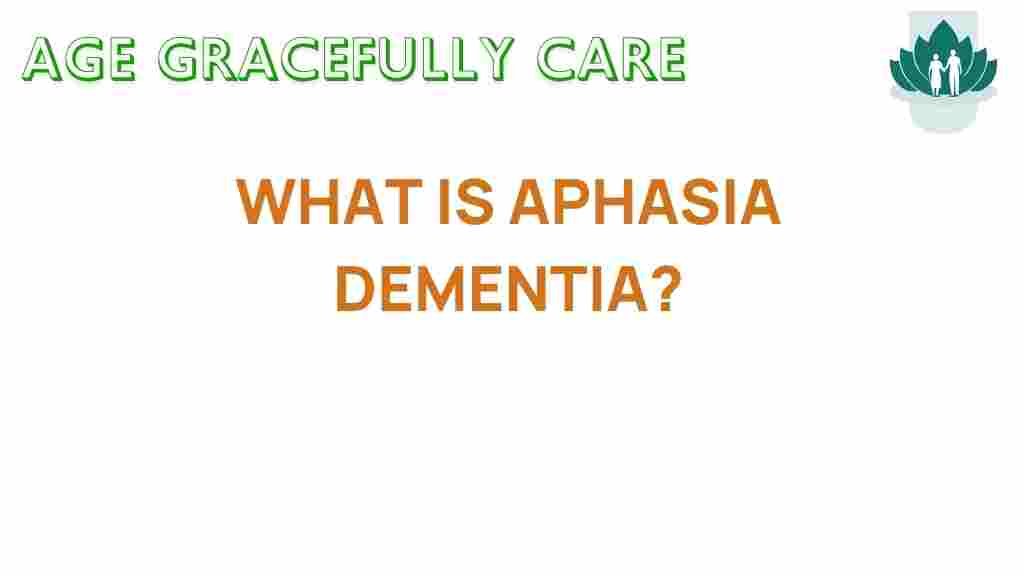Aphasia Dementia: Understanding Its Impact on Communication
Aphasia dementia is a complex and challenging condition that significantly affects communication, which is a fundamental aspect of human interaction. This article aims to unravel the intricacies of aphasia dementia, exploring its implications on communication and how it relates to various neurological conditions. We will delve into the nature of communication disorders, cognitive decline, and speech impairment associated with aphasia dementia and present effective patient care and support strategies.
What is Aphasia Dementia?
Aphasia dementia refers to a type of dementia that primarily affects language abilities. Individuals with this condition often experience cognitive decline that leads to difficulties in speaking, understanding language, reading, and writing. The term “aphasia” denotes a communication disorder that arises from brain damage, while “dementia” refers to a decline in cognitive function that interferes with daily life.
Understanding aphasia dementia requires a closer look at the neurological conditions that contribute to it. Many patients with aphasia dementia have underlying conditions such as Alzheimer’s disease or frontotemporal dementia, which can manifest in various ways, including:
- Difficulty finding words (anomia)
- Problems with sentence structure (agrammatism)
- Reduced ability to follow conversations
- Challenges in reading and writing
The Connection Between Communication Disorders and Cognitive Decline
Communication disorders such as aphasia dementia are often closely linked to cognitive decline. As the brain ages or suffers from neurodegenerative diseases, the areas responsible for language processing can become damaged. This results in a range of symptoms that can deeply impact a person’s ability to communicate effectively.
Understanding Speech Impairment
Speech impairment is a critical aspect of aphasia dementia. It can take various forms, including:
- Expressive Aphasia: Individuals may struggle to form sentences or find the right words.
- Receptive Aphasia: Patients may find it hard to understand spoken or written language.
- Global Aphasia: A severe form where both expressive and receptive skills are significantly impaired.
These impairments can lead to frustration for both patients and their caregivers, emphasizing the need for effective communication strategies.
Impact of Aphasia Dementia on Patient Care
Patient care for individuals with aphasia dementia requires a comprehensive understanding of their specific communication needs. Caregivers and healthcare professionals must be equipped with the right tools and strategies to facilitate effective interactions.
Support Strategies for Communication
Implementing support strategies can significantly enhance communication for patients with aphasia dementia. Here are some effective approaches:
- Use Simple Language: Communicate using short, clear sentences and avoid complex vocabulary.
- Non-verbal Cues: Utilize gestures, facial expressions, and visual aids to reinforce understanding.
- Be Patient: Allow extra time for the patient to respond and avoid interrupting.
- Encourage Alternative Communication: Explore options like writing, drawing, or using communication devices.
- Maintain Routine: Keeping a consistent daily routine can help reduce confusion and anxiety.
Step-by-Step Process for Enhancing Patient Communication
Improving communication with patients suffering from aphasia dementia involves a systematic approach. Here’s a step-by-step process to guide caregivers:
Step 1: Assess Communication Needs
Begin by assessing the patient’s current communication abilities. This can include a formal evaluation by a speech-language pathologist. Understanding the specific type of aphasia and the severity of the condition is crucial.
Step 2: Develop a Communication Plan
Based on the assessment, create a tailored communication plan that includes goals, preferred methods of communication, and strategies to be used during interactions.
Step 3: Implement Strategies
Put the communication plan into action. Use the support strategies outlined earlier consistently to facilitate better interaction.
Step 4: Monitor Progress
Regularly monitor the patient’s progress and make adjustments to the communication plan as needed. Keeping track of what strategies are working can help refine the approach.
Step 5: Involve Family and Friends
Encourage family members and friends to participate in the communication process. Educating them on how to effectively communicate with the patient can create a supportive environment.
Troubleshooting Communication Challenges
Despite the best efforts, challenges in communication may still arise. Here are some troubleshooting tips to address common issues:
- If the patient seems frustrated: Take a break and return to the conversation later. Use calming techniques to reduce anxiety.
- If misunderstanding occurs: Rephrase the statement or question using simpler words and provide context.
- If the patient is unresponsive: Engage them with familiar topics or activities that interest them to stimulate conversation.
Conclusion
Aphasia dementia presents significant challenges in communication, impacting the quality of life for both patients and caregivers. By understanding the nature of communication disorders, cognitive decline, and speech impairment, we can develop effective patient care strategies that foster better interactions.
Utilizing support strategies and a systematic approach can help bridge the communication gap, ensuring that individuals with aphasia dementia feel heard and understood. Involving family and friends plays a crucial role in creating a supportive community for these patients.
For further reading on communication disorders and strategies, you can visit this resource. For professional guidance, consulting with a speech-language pathologist is highly recommended.
By prioritizing patient needs and adapting communication methods, we can significantly enhance the well-being of individuals affected by aphasia dementia.
This article is in the category Health and created by AgeGracefullyCare Team
